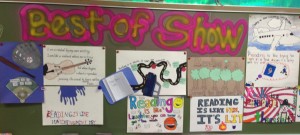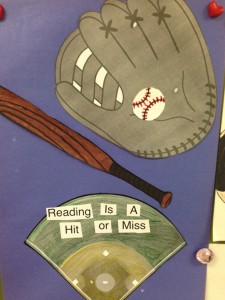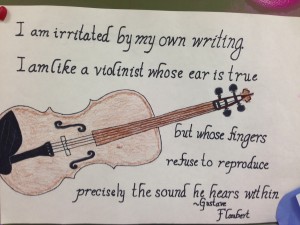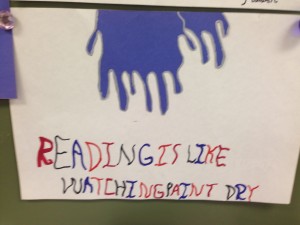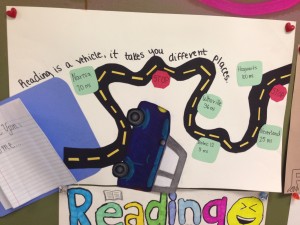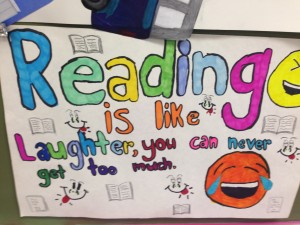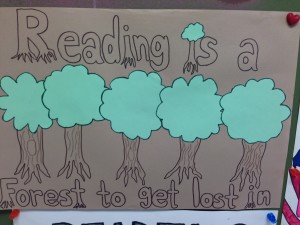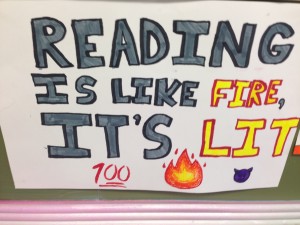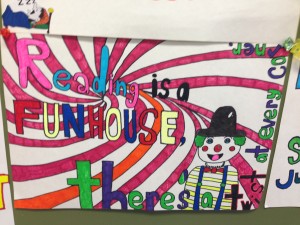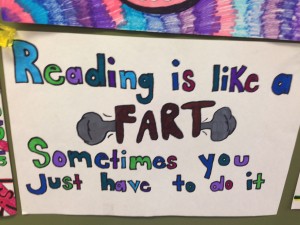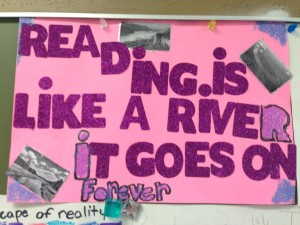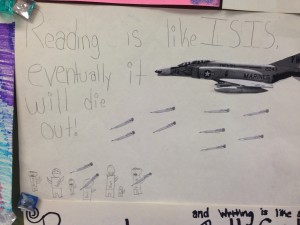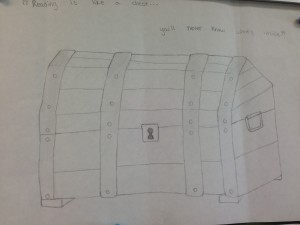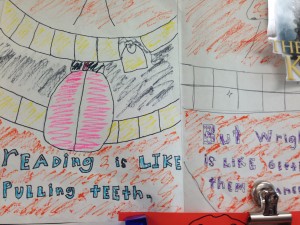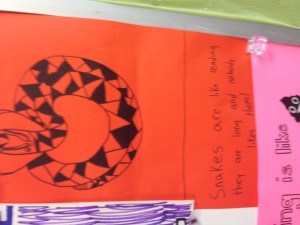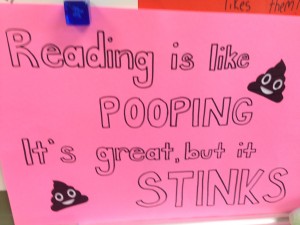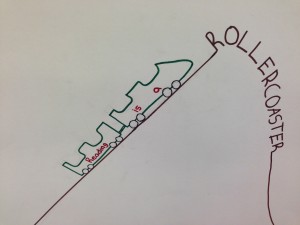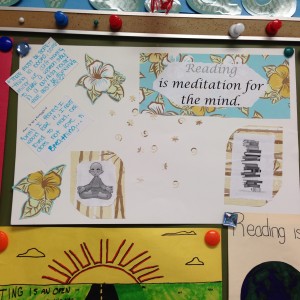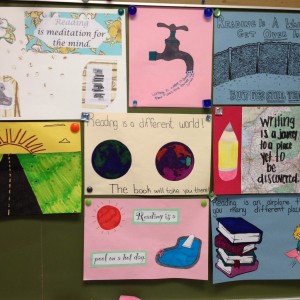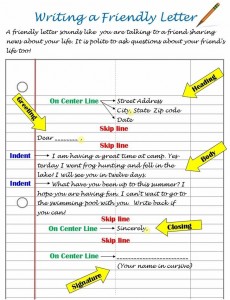English 9 Week 2
From Freshman Orientation through every single day of the first week of school, English 9 students have been told to READ THE BLOG everyday. Today students who scored a low score on the first vocabulary test were offered a chance to take a make up test for last week’s vocabulary test. Many students improved their test scores by several points. Those student who did not read the blog or follow the directions on their pass, are stuck with their original grades. Read the blog everyday to make sure you don’t miss out on opportunities.
Students also read and discuss Mary Oliver’s poem “The Journey.” Mrs. Scales demonstrated a variety of reading strategies and annotation skills in a “think-aloud.” Students wrote examples of how they observed Mrs. Scales:
- Previewing – Looking at the title of the poem and thinking about what a journey normally means
- ReReading – Reading most lines of the poem more than once as she worked her way through the poem.
- Questioning – Asking questions about what different words or phrases in the poem might mean.
- Skimming or Scanning – looking ahead in the poem to see how many time the word though was used.
- Summarizing – Reviewing a few lines of the poem together as a whole and then again when looking at what the first half of the poem meant.
- Skipping an Unknown Word – melancholy
- Living with Confusion – Not knowing what melancholy meant but not giving up, questioning who was giving bad advice.
- Chunking – Taking a few lines of the poem at a time
- Reading Closely – Interacting with the literal and figurative language of the poem.
- Imagining or Visualizing – Describing “fallen branches and stones” in the street and “stars began to burn through the sheets of clouds.”
- Comparing Text to Real-Life Events – Compared the phrase “tug at your ankles” to pulling her heart strings when she was in the Navy.
Students were assigned to read and annotate the poem “Digging” by Seamus Heaney prior to class tomorrow.
Make Up Week One Vocabulary Test
Week One Recap
Our first week in pictures. We had some great week 1 metaphor posters.
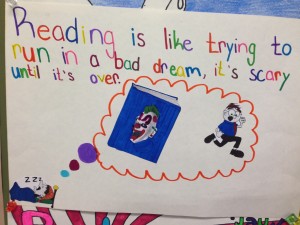 These posters represent our working with one of the 16 Habits of Mind that we will be studying this nine weeks. How do we each think about ourselves as readers and writers. Metacognition – Thinking about Thinking and using metaphorical language to express our feelings.
These posters represent our working with one of the 16 Habits of Mind that we will be studying this nine weeks. How do we each think about ourselves as readers and writers. Metacognition – Thinking about Thinking and using metaphorical language to express our feelings.
Students practiced class room rules by being in their seats working on the bell ringer by the time the bell rang. Everyday the day and date are written on the front board along with instructions on exactly what they need to be doing when the bell rings. This is an important aspect of our philosophy of being totally engaged for 47 minutes each day in what ever we are doing in English class. This means that as long as class time is being used appropriately students should be able to get most if not all of their work done in class. Homework will be reserved for those students who need a little more time to complete something, or those students falling behind.
Weekly Vocabulary
We also had our first weekly vocabulary test. Students were give 8 words and it was explained on Monday that students needed to know how to spell the words, understand the denotive and connotative definitions of each word, understand what part of speech each word is and be able to use the proper form of the word in sentences. Students were reminded each day of the week that the vocabulary test would be on Friday and that they should be studying the words. A link to Vocabualry.com was provided for additional support. Thursday students were told that the Friday test had been opened up on Canvas and they could take it twice as practice and to help them understand the type of questions that would be on the test. On Friday, I read the entire test to all classes, explaining what each question was looking for. This will not be the regular procedure for Weekly Vocabulary. There will be a test every week, but I will not typically be reading the questions aloud. Students were reminded that next week’s test words are already on the blog Weekly Vocabulary page and they could get a head start by working on the words over the weekend.
Any student who took the first weekly vocabulary test and scored a D or F grade, will have the option to retake the test during Academic Lab on Monday.
Metaphor Construction / Team Work
Today students worked w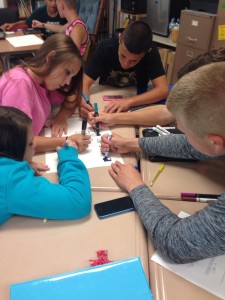 ith their groups to produce their metaphor posters. It was great to see the students working together to get their plans from yesterday worked out on their posters. Look at all those hands working together on one poster. Way to work as a team.
ith their groups to produce their metaphor posters. It was great to see the students working together to get their plans from yesterday worked out on their posters. Look at all those hands working together on one poster. Way to work as a team.
Just a point of clarification, a simile is in fact a specific type of a metaphor. So posters for this assignment can use like or as if needed. When asked on a figurative language test or worksheet to identify a simile, if the comparison includes the word like or as and simile is one of the choices it should always be selected as the best or most accurate choice.
Students were also reminded that the first weekly vocabulary quiz will be taken in class tomorrow. To help everyone understand the depth of questions that will be asked on the test, everyone was encouraged to take a practice test in Canvas prior to their class tomorrow when they will take the real test.
Metaphors of Reading and Writing Ideas
Today we worked on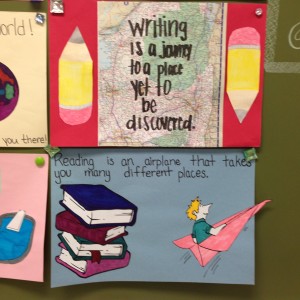 using metaphors and Smilies to Think about our Thinking concerning reading and writing. Groups selected their metaphors and planned their posters. Tomorrow, groups will make their posters. If you need ideas about how to construct your posters, here are a few of my favorite from last year.
using metaphors and Smilies to Think about our Thinking concerning reading and writing. Groups selected their metaphors and planned their posters. Tomorrow, groups will make their posters. If you need ideas about how to construct your posters, here are a few of my favorite from last year.
Day 3 Recap
Today, students took the Academic Literacy Questionnaire, which is useful as a way to discover their own habits and attitudes. It also invites student to think about the skills they need to develop to become more successful students, readers, and writers. This lead us to learning the word metacognition, a big word that means Thinking about Thinking.
Students were reminded to be studying their vocabulary list for the Friday test.
Students were also praised for doing such an outstanding job on their first homework assignment. This is my ninth year of teaching and I have never has such a fantastic completion rate on a homework assignment. Out of 96 students, only two students did not turn in the assignment. I am loving this group of kids. We are off to such a great start.
Metacognition / Thinking about Thinking
Day 2 Recap
We covered three very important items in class today:
- How to turn assignment in through Canvas. Using the Friendly Letter Introductions assignment we went step by step as a whole class to learn exactly how to submit an assignment into Canvas from a file or using a text box entry. Students who had chosen to do their assignments on paper were shown how to take a picture and submit the assignment by uploading the picture file. Most assignments in this class will be turned in through Canvas because it provides for a detailed rubric and I can grade all the assignments against the rubric, leaving comments and broken down rubric scores for each student.
- Weekly Vocabulary using Vocabulary.com. We read aloud and then paraphrased the Weekly Vocabulary responsibilities. A good paraphrase went something like this – Every student will find a new vocabulary list on the blog tab labeled Weekly Vocabulary each Monday. It is up to the student to study the words and be ready for a spelling/vocabulary test each Friday and a review test over all of the previous words every three weeks. Students were given a link to set up an account and join the class I have set up on Vocabulary.com to use as a study resource. On this site students can use flashcards and other study tools to learn the words. I will get a report from the site each week on how much each student is devoting to learning the words.
- What is a Capstone Project / Habits of Mind Portfolio ? A capstone project will be done once each grading period. The capstone project is an assigned task that demonstrates your proficiency and growth in many aspects of what has been covered in that grading period. You will be given specific instructions for each capstone project on exactly what is required, but you will be given a great deal of choice on how you do the assignment. Your first 9 week capstone project is your Habits Portfolio. This is a reflective portfolio that allows you to demonstrate that you understand each of the Habits of Mind habits and can put that habit in to your own words. It will also allow you to provide personal examples of your use of the habits. As all of the capstone projects you will also be graded on your writing, organization, and creativity. This will be the larges project for the entire grading period and worth 175 points. Students were cautioned that this is not something that can be put off until the end of the grading period and must be worked on as we learn about each habit.
Your Friendly Letter Assignment
What a fantastic start to the school year. I met almost all of the WHS Freshman and have to say, I liked them all. I can’t wait to really get down to work with this group! Today we went over the classroom layout, rules, and talked about my philosophy on assigning homework. While everyone is starting out the year with one very simple homework assignment, it will be my policy that homework will be assigned only on a by need basis. This means that if students are engaged and using their classroom time appropriate they should not have addition homework assigned. However, if students fall behind or need more study time than class provides they will be assigned homework on an as needed basis. I will provide in class time for all reading and writing assignments. Some students will need to devote outside of classroom time to catch up on reading if they are slower readers or do not finish an in class assignment. If this practice is not working, it will be adjusted as we go, but for now (after this first assignment) I do not plan to schedule homework.
An English 9 class syllabus was given to each student today in class. A second copy of the last page was also given to each student. This copy of the last page should be signed and returned to Mrs. Scales next week. Finally an assignment handout was provided to each student today in class. A recap of the assignment handout follows.
High school English is all about perfecting your ability to learn from the written word and express your thoughts in meaningful ways. To facilitate both I have chosen this friendly letter exchange as your first assignment.
Read your assignment handout carefully and use the following formatting information to complete your assignment over the weekend.
